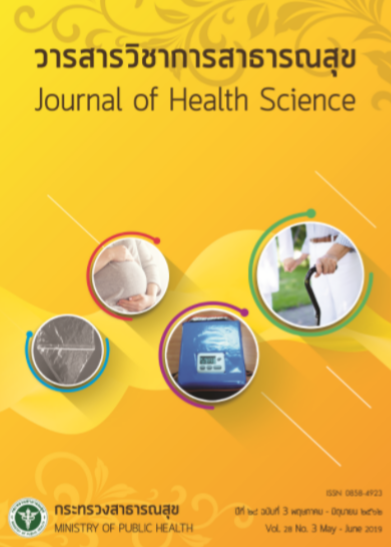Infectious Waste Management Behavior of Personnel in the Service Clinic, Ratchaburi Province
Keywords:
infection waste management behavior, clinical service, infectious waste knowledge, awareness effects of infection waste manageAbstract
This research aimed to study infectious waste management behavior, knowledge on infectious waste, and awareness on the effects of infectious waste management among clinic personnel in Ratchaburi province. It was conducted as an analytical research comparing infection waste management behaviors of clinical personnel in Ratchaburi province by gender, age, marital status, education level, occupation, income, work experience, and years of work. Statistical analysis was conducted to assess association among knowledge about infection waste management, awareness on the effects of infection waste management, and factor that predict infection waste management behavior of clinical personnel in the province. All the 291 personnel were included in the study, and data collection was performed by using questionnaires. Data were analyzed by using descriptive statistics, t-test, oneway ANOVA, and Pearson correlation coefficient. Analysis on the factors that predicted infection waste management behavior was performed by using stepwise multiple regression analysis. It was found that among clinical personnel clinic in Ratchaburi province, 51.5% were female, 27.8% of them aged 40-49 years old, 68.0% married, 61.5% had education level of bachelor degree or equivalent, 49.8% were with civil service or state enterprise, 48.8% had average monthly income higher than baht 50,000, and 26.8% had work experience of 21 years and above. For infectious waste management, majority of them had high level of behavior, moderate level of knowledge and high level of awareness. Clinical service personnel with different gender and age had statistically different infectious waste management behavior (p<0.05). There was no difference in other variables. There was a positive correlation between infection waste management behavior and the awareness as well as the level of knowledge on the effects of waste management; and that the equation obtained from multiple regression analysis based on such association could predict 21.6% of the management behaviors at the level of 0.05. The author suggested that the clinical service personnel should be supported on the knowledge about laws and regulations process for infectious waste management. Public relation via various communication channels should be utilized to promote awareness on their responsibility. Finally, there was a need for formulating policy from relevant agencies to supervise clinical service facilities for infectious waste management to be in line with the technical standards.
Downloads
Downloads
Published
How to Cite
Issue
Section
License
Copyright (c) 2019 Journal of Health Science - วารสารวิชาการสาธารณสุข

This work is licensed under a Creative Commons Attribution-NonCommercial-NoDerivatives 4.0 International License.







